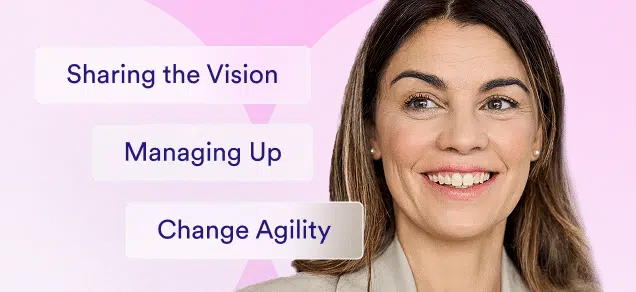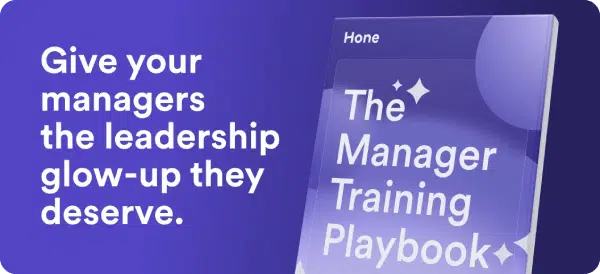Sam Levine: I'm going to give our amazing panelists about 90 seconds to introduce themselves. Panelists, the questions that I have for you are: What do you do? Why do you do it? And what do you hope to teach our community today? Would one of you like to start us off?
Jenny Dearborn: Just go left to right.
Sam Levine: Let's do it. Go for it. All right.
Jenny Dearborn: I'm Jenny Dearborn. I am based in Boston and am sitting outside right now. I am the Chief People Officer at Klaviyo, an internet marketing startup. I have been a chief learning officer, a chief talent officer, and have been in sales and an HR executive roles for about 20 years. I hope to bring wisdom and hard-won experiences through trial and error and mistakes along the way through a long career and am hoping to bring insights to the folks on the call today. I’m looking forward to the conversation with my peers.
Sam Levine: Thank you, Jenny. Appreciate it. Welcome and Malcom, why don’t you go next.
Malcom Glenn: Sure. Thanks, Sam. Thank you to the 51+ participants who are on the call today, it's really exciting to have this conversation with you. My name is Malcom Glenn and I live in Washington D.C. I wear a couple of hats. I'm the Director of Public Affairs at Better.com, which is one of the leading digital platforms to help people find purchase, insure, and close on a home. In fact, we were actually just named the number one startup by LinkedIn just a few weeks ago. Our goal, similar to making something more accessible like Hone, is to make homeownership more accessible for people across the country. I wear a few other hats. I'm a fellow for New America and a senior fellow for the Center for Workforce Inclusion. I do this work because I just really love cities and local communities. Everything I do ties back to this notion of creating the most equitable local communities for people from underserved community communities. I formerly led policy and communication strategies around all of these issues at a couple of big companies, specifically Google and Uber. I've realized through that work that none of these issues – whether it's transportation, work, or housing – exist in a vacuum. They're all related to how we envision making cities thrive, particularly in ways that will make the private sector help push cities to be more equitable. My goal today is to help you all come away with some concrete strategies on how to stay engaged and give your employees the space they need to have these conversations in a way that won't have them push each other off.
Sam Levine: I love it. Thanks. Welcome. Alisa, how about you?
Alisa Cohn: Great. Hi, everybody. It's great to be here with you today. My name is Alisa Cohn. I'm an executive coach. I work a lot with startups. Prior to that, I was the CFO and Head of Strategy at two startups. I'm also a former consultant. The other thing I do now is write for Harvard Business Review, Inc, and Forbes. I also do guest lecturing at Harvard and Cornell and the Naval War College and I'm also part of the Runway Program at Cornell Tech, which helps startups postdocs commercialize their research. All of that being said, I got into coaching 20 years ago because I had this voice and music in my head that told me to make a difference. What I care about every day is making a difference. I think that startups are a great place to make a difference and I want to make a difference with you all today for and with you all today because I truly believe that we cannot resolve any issue if we can't talk about it. The idea of having a safe space and the structure, context, and tools to talk about hard things is key. It’s only through talking about hard things that we will be able to resolve them and come to a shared understanding.
Sam Levine: I couldn't agree more. Thank you. Brian, take us home.
Brian Emerson: Good afternoon or morning or evening, everyone. My name is Brian Emerson and I live outside of Washington D.C., not too far from Malcom. I have been doing organizational development and consulting work for about 25 years. Right now, I work primarily in the areas of culture, strategy, alignment, and leadership development and do some executive coaching as well. My primary area of focus is paradox and polarities, so helping people navigate two seemingly opposite states at once, like candor and diplomacy. I teach about polarities and paradoxes at Notre Dame and Georgetown University University of Maryland and recently started a new business that has launched a number of assessments helping leaders to ascertain how well they're navigating a certain tension inside of their life. That's really my niche. Why I do it? I think people need to be having different conversations with themselves, their partners, and their colleagues. I think that if we don't have different conversations, our systems will be in trouble. That's why I do what I do, to help increase the consciousness on the planet and people's capacity to be able to love. That’s what I hope to teach today. I would also like to echo what my esteemed colleagues have said: I also hope to teach that we need to show up wanting to learn more. I'm here to learn as much as teaching today. I'm really looking forward to the conversation.
Sam Levine: Thank you, Bryan. For those of you who are new to Hone and haven't seen my face before, I'm Sam and I run Hone’s learning experience. I'm also a coach and have a Master's degree in Clinical Psychology. Similar to what Brian just said, I'm fascinated by the polarities of leadership, which we'll talk a little bit about today as well.
So let's jump on in. Here's what we'll focus on: How do leaders honor freedom of speech and uphold values like civility and mutual respect when political conflict does arise? How do we transform conflict into deeper understanding? More compassion and more consciousness, perhaps? And then, what next steps will you take to navigate political conversations effectively at work? And as we do with every Hone class, we’ll then end with your commitments.
So, let's jump in. Before we get to this question, I just want to read off a few fascinating statistics. Sixty-four percent of people say political discussion at work has grown more heated over the past five years. Seventy-two percent of people feel stressed or anxious when heated arguments occur. And this one's my favorite – 67% of millennials say they quit their job over political differences with their boss. All those statistics to frame this question: how do leaders thoughtfully embrace political conversations in the modern workplace? Alisa, why don't you start us off, and then we'll jump around.
Alisa Cohn: Sure, Sam. This is the largest question there is, right? How do we thoughtfully embrace these conversations? From my point of view, I've been working with my leaders to recognize their reality right now. You have to find ways to give people the time and space and tools to embrace their reality. What that really means is encouraging people to not use judgmental language, but to use fact-based language. And encouraging them to set aside specific time for having those conversations and other times for not having those conversations.
Sam Levine: With that, who else wants to jump in?
Malcom Glenn: I just want to jump in and say, I think the stat Sam mentioned how folks are leaving their companies because of disagreements with their boss is really apt if you look at what’s taken place over the last couple of weeks at Coinbase. You may have seen that they recently announced that they would not be taking a stance on political issues and won’t allow employees to discuss politics in the workplace. As a result, around 5% of their workforce decided to take a severance package and leave. I think Alicia's point is exactly right. You can't shy away from these conversations. You have to proactively embrace them and take them on. Companies are inherently risk-averse, but I think we need to reject that risk aversion. You can't bury your head in the sand. You have to embrace this and if you do create the space and we'll talk a little bit more about what the creation of that space looks like. You're gonna have employees that even in points of disagreement are a lot more comfortable and appreciative of working at the company where they are.
Sam Levine: Right. Jenny, did you want to jump in?
Jenny Dearborn: I'd love to jump in and say that we have seen a tremendous trend in leaders feeling more comfortable getting engaged in politics. Twenty years ago, it used to be that nobody ever spoke about politics or religion. You didn't talk about it, you didn't ask about it, you didn't engage. You didn't make campaign contributions on behalf of a corporation.
We don't see that now. The best, most successful, and admired leaders, like Tim Cook, come out and make a statement saying how they feel. That is a significant talent retention tool for young people. I think leaders in organizations need to recognize that. You need to think about who your customers are and who your employees are. If you’re trying to attract and retain talent today, young people who live in cities are politically active and they want to work for a company that has a strong sense of purpose and takes a stand. Business leaders need to recognize this change in the workforce and realize it’s okay to talk about these things, by creating a safe place to do so.
Sam Levine: Yeah, I love that, Jenny. To follow up on this, I’d love to hear from the panel. How do you decide then? What type of statement to make? Is it just something that needs to be deeply aligned to your culture or is this something that needs to be deeply felt as a leader? How do you figure out what kind of statements you make?
Brian Emerson: I don't know if you saw, but Bob Feldman had an article in HBR earlier this month and it said that the workplace is one of the last places where the vast majority of Americans interact with people who might have a different viewpoint than they do. It is so crucial for different viewpoints to have a voice for democracy. This idea of making a statement and allowing space inside an organization for different viewpoints is really important, right? It's a tension that has to be navigated.
Jenny Dearborn: That's a great point and I'd love to add on to that. The muscles that we use to navigate through difficult conversations about politics in the workplace are the same muscles that we need to exercise when we talk about our product roadmap or marketing campaigns or whatever it is that you're talking about. You need to be able to engage in a conversation with lots of different opinions. You should come to that conversation with deep respect, empathy, understanding, and curiosity to really understand different points of view because your company's product or the success of your company might be on the line. Do we go all-in on that path for product development or this other path? It's critical that we get this right and to do so, we have to exercise these muscles of deeply listening with curiosity and respectful and non-defensive communication. These are the same muscles that we need when we talk about other things that are charged like politics.
Sam Levine: Absolutely. Anything to add from any of you on this? One of the things that I find fascinating, which is perhaps different from a product roadmap is, what are the facts? When it comes to politics, we've seen so much false information or fake facts. I'm curious, how does that shift the way that you create policies or procedures around how to navigate political conversations at work? How do you advise that leaders and others think about that?
Malcom Glenn: Well, I think one of the ways you do that, Sam, is you can't think about these things only when there's an outcry or there's a controversy. You need to be thinking about these things well before that. While there are different ways in which people can interpret different information, there are some foundational points that you can map your response to based on what your values are. I think that the foundational question of “What are your values?” is really important. No company should ever think about engaging in these types of conversations, putting out statements, determining what's truth and not truth, unless they've already established what their values are. If you know what your values are and if your values are about inclusion, treating people with respect, or building equitable communities with the product or the platform you're creating, you really just need to ask yourself, “Is this aligned with our values?” It might be a little bit unclear whether someone is saying something that's true or not, but I think for better or for worse, one of the positive realities of the situation we're in today from a political perspective is that the lines are drawn. It’s pretty clear who is saying what and whether that is aligned or not aligned with your values. Before you can even have a conversation within your leadership team around what to say and what's real or not, you have to ask, “What are our values?” If you know the answer to that question at your core, then I think the answers that will follow will be a whole lot easier.
Alisa Cohn: I really appreciate your point and I would add that I think for many companies culture, vision, and values had previously been seen as “soft stuff” that wasn’t very important. I think this year, if nothing else, has brought to light the need to engage in those conversations and to really clarify like Michael was just saying, our values and where we stand. From my point of view, this really drives the need for training education and culture creation around how to have candid, respectful conversations and teaching employees and leaders how to build those muscles. Right now, that's where companies can rise or fall. Do their people have this skill or not?
Brian Emerson: Yeah, I think the piece on values is so important from the organizational standpoint. But I think that when we're talking to other people, we need to try to validate what their values are. As Malcom pointed out, the lines are drawn.
One of my tips for leaders is to give up. The second you go into a political conversation, you've got to give up on trying to convince someone else, instead, go in with a sense of curiosity. Assume you will convince the other person of nothing and be curious and want to learn from them. Ask yourself, “What is there to learn?” and then validate their values, which is underneath the facts. I don't care if you have the facts right or wrong about gun control, right? What I can do is show you’re listening and respond by saying, “It sounds like you don't want people to tell you what to do. Sounds like being able to determine what you can do is really important to you.” When the person feels heard, you've gotten below the facts. But if you go and try to convince them like that at the value level, we can usually find some sort of agreement. But, to your point, Sam, it's people will never agree on the facts in today's day and age. Instead, focus on the values.
Sam Levine: Yeah, thanks. Thanks, Brian.
Jenny Dearborn: If I could say one other thing about values. In my experience, corporations put on paper what their values are, but it's possible that the company is not totally aligned with those values. Sometimes values are aspirational and are the things that we want to say we value, but is that really how communication happens? In reality, what is it your people actually value in conference rooms, everyday decisions, how people are promoted – whatever it is. If you have a value statement that is not universally held and then try to build a political discourse on top of that, you're in really dangerous territory.
Sam Levine: It's such a good point, Jenny. It's like the litmus test of whether or not you're really living your values. I can't think of a better one than having political conversations at work and determining what it is that we really care about. Do we really value mutual respect? Let's put it to the test.
To ask a tactical question based on what some of you have said, I'd love to hear your thoughts for those who have joined the call today. Can I have a Biden or Trump sticker on my desk? Or can I raise my political affiliation in a conversation on Zoom with five colleagues? How do we navigate that? At a high level, it's attached to our values, but how does that trickle down into the day to day political movements that folks in our organizations make? What are your thoughts on it?
Malcom Glenn: I love this question and I have tons of thoughts. I actually think you need to tie it to your business. I'll just do a little bit of a compare and contrast. I remember, in 2016, the day after Donald Trump was elected, it was probably the hardest day I've ever had going into work. I went to work. I cried and I cried openly. That was the only time I've ever cried at work and one of the few other black women who worked in my office came over and gave me a hug. I remember thinking we have values on paper but it doesn't feel like we're given the space to be our full selves in how we process what was going on in the world, in that case, four years ago.
I think that was not necessarily an indictment of where I was then, but the evolution of how companies are recognizing this today. Fast forward to now and at Better.com where I work today, we've tried to address some of these issues much more aggressively and proactively to give people the opportunity to state what they believe. I think the best way to do that is not to say, “Are you pro-Trump?,” or “Are you pro-Biden?” but it's to tie it back to what you're doing there from a work perspective. We have not situated our political conversations necessarily on, “Who do you want to vote for?”, we've situated them back to what we do as a company, which is helping people get access to homeownership. There is a whole history of racist efforts, discrimination, redlining, and predatory lending practices in our space. We've said, “Let's not just have a generic political conversation, but let's actually have a very salient political conversation related to what our business is.” We started something that we call a “racial equity book series.” What that does is it gives employees a very explicit company-wide sanctioned space. We started with a book by Richard Rothstein called “The Color of Law,” which talks about housing segregation and redlining. What we do is we give employees an hour a week to talk about whatever they want related to that. We have offices in red states and we have offices in blue states. There are very, very contentious conversations that take place in the course of those book clubs. I was in one last week and I remember someone after the book club saying, “I've never been in a work context where I have been sanctioned to have this conversation, it will probably reflect positively on me when I ultimately have my performance review.” Next month, we're going to bring in Dr. Rothstein to have a company-wide conversation where we dig deeper into those issues. I think the way you do it is not by saying, “Hey, you know you’re blue stripe or red stripe.” We actually say, “Let's talk about what you believe and it's okay if we disagree. In fact, we encourage that, but let's tie it back to our business so you don't come away saying, ‘That guy who likes Trump, or that guy who likes Biden is wrong,’ but you say, ‘Oh, this helps inform how we deal with customers and whether we're showing empathy when we're talking to a person who might be going through the mortgage process for the first time.’”
I think it's really important to not just say, “Let's talk politics,” but say, “Let's talk politics in a way that ties back to what we should all be here doing.” Of course, if someone feels like that's not aligned with the broader mission of the organization, then perhaps that's not the space for that person to be working.
Sam Levine: Thanks, Malcom and others for sharing your thoughts.
Alisa Cohn: Malcom, I have a question for you. I thought that was very interesting and helpful and makes the conversation a formality sanctioned by an employer. In my experience, the CEOs that I work with are also dealing with people having informal, unsanctioned conversations that can sometimes get contentious. There's also the question someone asked in the chat earlier about social media and I think it's been very difficult to tread. I want to share some thoughts, but Malcom, I’d love to hear from you also. What I've been trying to do with the CEOs and HR folks I'm working with is distinguish free speech from hate speech and where to draw the line. Is there a solid line now? You can't necessarily say because that can also be subjective, although there is a sense of erring on the side of free speech. What I mean by that is don't put yourself in the position that someone's going to ask if that was hate speech. Make sure that your employees are on the right side of that. If you are on the right side then those conversations can happen. But Sam, do you mind me asking Malcom, how have you guys dealt with that?
Malcom Glenn: It's such a great set of questions. What we've seen is that giving that sanctioned space actually gives people the outlet they need so that they're not as predisposed to get into fights or contentious arguments. We don't say is just because you're having this opportunity to talk about housing discrimination in a company-sanctioned way, that means you don't get to talk about politics. What we think it will do and what we’ve started to see it do is people come to work with burdens, intention, and pain from the outside world. Anyone who has been coming to work as a black person the last couple of months has really felt that there is a trauma that makes just doing your job, whatever your role may be, challenging. It's not necessarily related to a need to talk about why I don't like Trump, it's a need for an outlet to really feel like I'm heard, I have space to talk, and I'm talking with people who, to Ryan's point, don't necessarily need to be convinced, but are at least going to be thoughtful about what I have to say.
What we've seen is that we haven't gotten particularly prescriptive around saying don't have these other conversations, or determining if there is a specific line people cross when it comes to things like hate speech. It's a little bit like the Supreme Court and pornography – you kind of know when you see it. What we have seen is when people have an outlet, the other conversations are calmer. We have seen fewer issues on Slack, we've seen fewer people coming to HR with complaints and issues about raising their voice. Now, that's not necessarily going to be sustainable, but in the short term, providing that sanctioned space specific to our company has helped reduce the other issues we were worried about and will continue to be worried about over the course of the next couple of weeks. It remains to be seen whether that is the right strategy, but we've certainly been feeling pretty optimistic about what's happened over the last couple of months.
Jenny Dearborn: Since you got to ask Malcom a question, can I ask my question? I'd love some advice on what to do when you have a company that is or seems to be very politically aligned when a majority of the folks at that company lean a certain way, whether they're vocally saying it or not? What do you do if you’re in the minority of people that feel a different way? Your comment triggered it when you said that you came to work in 2016 and had a very strong emotional reaction. I remember in the news at the time, companies were putting out very strong statements saying this outcome is a horrible thing and we really want to align with how our employees feel and we're there with you. I'm using hyperbolic language, but they made it very clear that the company felt great empathy towards the majority of their employees that felt like this was a bad decision that the country made. Then, a small group of the employees at that company said, “I don't feel like it's safe for me as a Trump supporter to come to work. When everyone around me is sobbing, I don't want to be quietly going, ‘Yay!’” Of course, I'm using exaggerated language to make a point, but how do you navigate that? As an HR person that's trying to create a safe place for everyone where you really want to honor this very strong reaction that the majority of your employees are feeling, while also honoring the feelings of other people who don't feel like they're safe now? How do you do that?
Sam Levine: I love that question, but I just want to add one little thing to it. Then, we'd love to hear Alisa, Bryan, and Malcom addressing this is a great question. I’d love to hear your thoughts not only through the context of the HR professional but also through the context of a manager because we have a lot of managers on the line. Through the eyes of a manager or an individual contributor, how do I navigate that in the office?
Malcom Glenn: I'll be brief because I also want to hear what the rest of the panel has to say. But I will say that distinction is actually really important. Sam, thank you, for your question. I don't envy the position that HR folks are in around this space. That's just my quite frank and honest opinion because I think it will be challenging to create an environment that allows everyone to be their full selves, which is the stated mission of so many HR functions. Quite frankly, I don't know that you can create a space where legitimately everyone is going to feel entirely comfortable being themselves. This is a little bit of a cop-out answer, but I think it really goes back to that question of values and the earlier you start that process and the more aggressively you are forthcoming about what your values are – we believe immigrants are the backbone of the country’s workforce, we believe in full inclusion for the LGBTQ community, or we believe, truthfully, that black lives matter. I think you have to say that as much and as earnestly as you possibly can, such that, when a person gets elected that feels deeply inconsistent with those values, you will go back to those as the foundational way to talk about how you're aligning people with values before a president gets elected that people like or don't like that's particularly contentious.
If we do get to that point and there are people in the workforce that feel differently, I think that means a really challenging reckoning with those employees about what those values are. Coinbase did a version of that in the opposite direction. They probably didn't mean to lose 5% of their employee base, but maybe they did. I don't know because I don't work there, but maybe they said, “We don't want people here who aren't aligned with our values.” They didn't fire those people, they gave them severance packages. This was almost their way of saying these are the values. If you're aligned with them, you're probably going to be successful at this company and you're gonna help us do well. But if you're not, then maybe it's mutually disadvantageous for us to continue to have a relationship together. The HR question is really hard, but I think if you articulate your values as clearly as possible, hopefully, you can try to mitigate some of those issues before they come up around a particularly significant external situation.
Sam Levine: Anyone feel they can add on to that and answer Jenny's question?
Alisa Cohn: I would just add that I don't envy them either. You could be a new or more experienced manager, but honestly, I don't think anyone's experienced enough to really handle 2020 in all the ways it's unfolding. Right now, we're talking about this political environment, but there was also some social unrest, right? Then there was a sudden work from home mandate and more. I would just say recognize that everyone's at the end of their rope or fuse. That said, on a lot of these issues, there is not really common ground. It's more like I have a set of beliefs like this and you have a set of beliefs like this. We have to recognize and embrace that reality and give people space to cover it. It's also helpful to find common ground around work because, at the end of the day, I also think that sometimes it's not actually productive to go on and on about all our points of disagreement. We want to have a place where everybody feels fully able to express any thought that comes into their head.
There are workplaces that are tilted a certain direction which could make you feel safer or less safe, but you still like that workplace. Let's find out what we can agree on and come back to connect as human beings around a shared purpose or values. We're trying to get this thing done or get this product out the door. We're trying to actually create an equitable world in a certain kind of way. Let's focus on that. Sometimes I think that can salve the wound.
Brian Emerson: I would echo that. I don't envy HR folks.
Alisa Cohn: Good luck Jenny!
Jenny Dearborn: Thanks a lot, team. Thanks for the vote of confidence.
Alisa Cohn: We're right behind ya!
Brian Emerson: I think diversity of thought is so important, especially in the larger context of diversity and inclusion, especially diversity of political ideology. How do we continue to create that space and I love how both Jennifer and Malcom were alluding to the fact that this isn't going to be over 20 days. The election will happen 20 days from now, but this is not over. It's about how we continue beyond that because there will be winners and losers. We're going to have both on our teams, but how do we deal with that?
One of my tips for leaders and managers is that you know that someone is struggling. If you know that you've got someone like Malcom who's upset, simply ask them, “What is the most upsetting thing about this? What's most upsetting for you?” Or, if you've got someone who's thinking “Yay,” ask them, “What's the most exciting part about this for you?” Because then you get to know the values, right? I think it was Malcom who said this, but you want to make people feel heard, right? It's about when we can get to that level where people not only feel heard, but they also feel it. That's what creates a different conversation and dialogue.
Sam Levine: Great point, Brian. I want to ask one other related question. While I do that, for those on the line, we'd love to move this into a Q&A after this question, so please feel free to put your questions in the chat. We'll try to get to the majority of them before the hour is up. But the question is on something that Jen actually commented…
Brian Emerson: I actually didn’t get a chance to ask Malcom a question. Everyone else did but me.
Sam Levine: That’s true. That’s true.
Malcom Glenn: Bring it, Brian, I'm ready.
Sam Levine: I like that, that'll be our first question. But I want to allude to something that Jen actually put in the chat here. She said, “Malcom, thank you so much for that example about giving an outlet rather than trying to regulate. It touches on what Brian just said around giving a space for others to feel seen and heard. Well, how do you create that outlet? If it's not about regulation, how do you create a safe outlet for folks to feel seen and heard, especially remotely? How do you do that?” Be curious to hear some of your thoughts.
Alisa Cohn: I'll jump in. I appreciate that you said “especially remotely” because so many of us are having a remote experience. I think part of it is the way you – the manager – act. Right? Managers are the ones who are leading the way. We can't say enough about leading with curiosity, respect, and bringing people out and showcasing that we can, to quote Ruth Bader Ginsburg, “Disagree without being disagreeable.” If you can be a role model and model that behavior, it’ll be like you have a glue to tie the team together and empower them to be able to have uncomfortable conversations. That's the name of the game when it comes to political discussions.
Malcom Glenn: I want to follow up on something that Alisa said in the previous answer, which I think applies to what Alissa and Sam both said. When we're working remotely in the midst of the madness that is this year, we need to acknowledge that things are infinitely more challenging than they've effectively ever been. Everyone is on edge and everyone is dealing with challenges that are entirely unforeseen. We need to lead with kindness and say, “Hey, we're having a meeting about XYZ in the context of our role. I know it's been a tough couple of days, weeks, or months and I know everyone is stressed and dealing with a lot and this is the last thing they want to do. I understand that we do have a job to do, but I'm not bringing my A-game all the time and that's okay. We're going to get through this and things are going to be better.” Just leading with that sort of sense of kindness, especially when we feel so disconnected over Zoom, can go such a long way.
Brian Emerson: I would say, model. As a manager or leader, how do you model letting go of your certainty? I think just to be able to say to your people, “ Yes, I'm voting, but I know that I don't have all the answers.” Just adding that opens the doorway to I'm not certain. I also think asking people, to Malcom’s point, and acknowledging that our country is in a world of hurt right now. Our democracy is in trouble because we can't talk to one another. Democracy depends on dialogue. How can we make sure that we're in dialogue about what's happening in our country and then let people come up with their ground rules? Our employees want to have the conversations and we often don't give them the credit. To Malcom's point, if you can't create the space, maybe they will.
Jenny Dearborn: If I can add something to that. Going back to a previous thought about exercising the muscle around having open conversations about political topics leads to healthy conversations about other things. Leading with empathy and curiosity is more important right now than ever before. There's a great Accenture study that said, 40% of CEOs say their number one worry is workplace mental health leading into the winter. They've got companies of people they could rally when this first happened because it was new and we were on adrenaline, and then it kept going on, but it was okay because it was summer. Now, we're not going to be back in the office until probably late spring or summer of 2021. You’ve got a very tense environment because 2020 is a dumpster fire. We're headed into the winter and people are going to be isolated, lonely, and on Zoom all day. It's going to be dark when they wake up and open their laptop in the morning and dark when they close their laptop at the end of the day. People are just really on edge. This election is a great opportunity to lead with kindness, empathy, and curiosity. This is another opportunity for us to practice the fact that we're all in this together. We are one group of people that care deeply about each other and we will get through this. We need to remember to be very good to each other because I'm genuinely worried about workplace mental health as we head into the winter.
Brian Emerson: 2020 has been so bad that people are developing this mindset of, “I can't wait for New Year's, everything's going to be better as soon as we get there.” But that's not true. Your point is so spot-on, people are going to hit a wall in early 2021 because they thought 2020 was over.
Alisa Cohn: Yeah, so yeah, that's so true. I just wanted to add: lead with curiosity, lead with kindness, and lead with humor. I’ve found adding a little levity to all these conversations can be very helpful. You asked earlier about how we do this remotely when we're all on Zoom. Because we're all on Zoom, I decided I needed to up my virtual presentation game. Back in April, I talked to an expert on this and it really stuck with me. He said, “I always make my slides funny.” I was like, “Oh, yes, like, compelling, right?” He said, “No, funny. People are more open to creativity when they're laughing. Playfulness and humor help us all learn, so I like to create that kind of environment.” Well, I took that to heart and I've seen it work with my clients. I think we all need a little more laughter and maybe music.
Sam Levine: It would’ve been great if a song came on like right now. No better transition than that.
Alisa Cohn: Yeah, let's do that next time, Sam.
Sam Levine: While we wait on any other questions to come in and feel free to leave them in the chat, I'll ask just one more the follow up on this conversation. When you're in these moments that feel tense and feel full of conflict, what are some thoughts that you have on how to defuse the situation? Alisa pushes towards laughter, but I'm curious if you have other thoughts on how to navigate in those moments.
I'm remembering a quote from Jim Collins, who is an organizational consultant and best selling author of “Good to Great: How Some Companies Make The Leap...and Others Don't.” He talks about how at great companies, there's a level of tension that's acceptable and people learn how to embrace and navigate that differently. So I’m curious, what are some of your thoughts on how to navigate those moments differently than perhaps what the status quo suggests?
Brian Emerson: So much of these political conversations are linked to our identity right at this moment. When our identity feels threatened, the amygdala goes off. It's just like being attacked by a tiger, right? The first thing that you can do is just stop and breathe. That's the first thing.
Malcom Glenn: Brian's exactly right. There's one value in the fact that a lot of these conversations aren't taking place in person. When you get a Slack message, email, or some other sort of chat, you have the space to take a second before you respond. I know my responses are orders of magnitude better when I take a second before I just type back. I think if we all just take a second before we respond in a defensive manner, then we can defuse a lot of these situations before they escalate out of control.
Brian Emerson: And ask yourself, “What's the intent in my response? Am I right? Am I responding to defend, to convince, to learn?” If your response isn't to better understand or to spread kindness, then I would take a timeout.
Sam Levine: We have one question from Tom in the chat and I think this is a great one, but I don't think there's a set answer for this. Tom asked, “Should you change anything about what you do outside work to be a credible, balanced leader supporting all employees inside work?” What do you think?
Alisa Cohn: What comes to my mind is not like you should go out and find another hobby for stress relief, but that you should build your network. We are all very much in our own bubble. We're in our social media bubble, in our friend bubble. I suggest everybody seek out people who disagree with them outside of work and try to understand their point of view. You're not going to convince them, as Brian said earlier, but it's helpful for you to be exposed to other people who are outside your bubble. That brings you a different perspective so when you go back to work, you can help people better navigate and understand.
Jenny Dearborn: I second that completely. The more diverse your outside experiences are, the more creative you are, the better you are at problem-solving, and the larger your network is, the easier it is to find talent you can leverage for different projects. I was an executive coach before I came back in-house to be the CFO of the company where I am right now. Working with executives, if they would get really stuck, I’d tell them, “Dude, you need to go take helicopter flying lessons or go learn to play the guitar or take a night cooking class once a week. You need to completely change your perspective and bring a whole new way of thinking about things into your problem-solving toolkit to be able to become unstuck.”
Malcom Glenn: I think those are both great points and I think those work most effectively when you have a work environment where you are welcomed, supported, and given the opportunity to thrive. I think when people find themselves in more challenging work environments, they need to look outside of work for that community because they're not getting what they should be getting from their manager or from the executives of their company. In an optimal work environment, I think, what you will set is exactly correct. I do see situations where the only space where you feel supported and where you feel like you can be yourself is outside of work. You might even disproportionally lean into that effort outside of work because you're not getting it over the course of your workday. I think that's the goal. That's the outcome that managers and executives should be striving for. But certainly, that's always not the case for some employees. I think they need to find that respite, particularly saliently, outside of their work context
Sam Levine: As we come to the end of our hour together, I just want to appreciate all of you for the thoughtful and powerful conversation and the many great ideas, strategies, mindsets, values, and talks about a lot of important things today. I hope that everyone on the call took something meaningful from the conversation today. I want to close with a special opportunity from Hone. As part of our mission, we're offering free enrollments in a number of our classes over the next month, which include topics like building high trust relationships. Really at the core of a lot of what we talked about today is trust and how to build trust with people who might not think or have the same perspectives as you do. Other classes include overcoming resistance to change and leading compassionate conversations. I’ll be leading a powerful workshop on that coming up on the 22nd. So if these are things that seem interesting to you, or you want to learn more about mindfulness, energy management, or even parenting during COVID-19, we have more classes coming later this month. You can sign up today at honehq.com and use promo code VOTE to sign up.
I hope that all of you on the call today will take time to vote in a few weeks. But until then, please check out the offerings that we have a Hone, and again, I really appreciate you all joining today.














